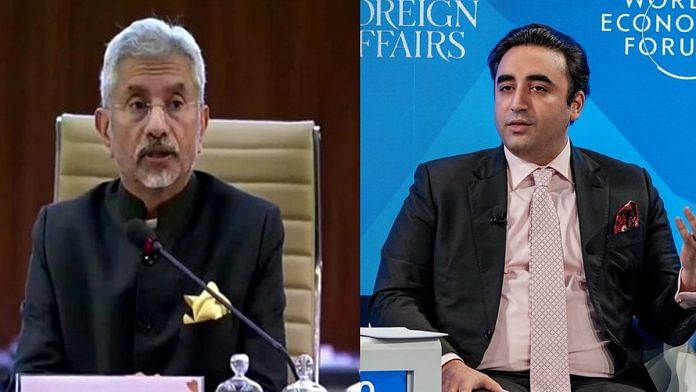Foreign ministers from Pakistan, Russia, China and other member-nations of the Shanghai Cooperation Organisation are in India for two days to discuss “the way forward”. But for the moment, it is enough that Pakistan’s foreign minister Bilawal Bhutto Zardari will sit on the same table as India’s S Jaishankar.
Not that anything is likely to come out of it. At least since the Pathankot attack in 2016, the Narendra Modi government has made any talks on the end of cross-border terrorism conditional. However, it is worth noting that it took back-channel talks with Pakistan to open the Kartarpur Sahib Corridor in late 2019 — even though the Imran Khan government at the time had been hugely critical of the revocation of Article 370 in Jammu and Kashmir earlier in August — as well as a renewal of the ceasefire on the Line of Control in 2021.
Clearly, there is no such thing as a full stop in the India-Pakistan conversation — it has only been pushed behind the scenes. The key interlocutors were National Security Advisor Ajit Doval, on behalf of India, and the former Pakistan Army chief, Gen Qamar Javed Bajwa. Both were responsible for both initiatives – the Kartarpur Sahib corridor as well as the LoC ceasefire – even though these have not translated into a larger peace deal, as was hoped by people on both sides celebrating 75 years of their respective independence.
It was also hoped that Shehbaz Sharif, when he became prime minister last year, would be able to push through other pro-people initiatives, but the younger Sharif was far too afraid of his own shadow, leave alone Imran Khan. Modi, meanwhile, was content not to push the envelope. In any case, the Russia-Ukraine conflict soon took precedence.
Also read: Jaishankar should watch Pathaan. He is working on Modi’s ambition to be leader of South Asia
Building narratives, identifying interests
If it were not so tragic, it would be funny to see how the governments in Delhi and Islamabad are manipulating their own influencers on social media to try and muddy the narrative about the other. In Delhi, pro-government voices are sneering at journalists hoping to meet the young Bhutto scion, forgetting that in the age of G-20, Prime Minister Modi is constantly invoking the Sanskrit phrase, ‘atithi devo bhava’, or the ‘guest is god’.
While in Pakistan, two influential journalists conducted a TV conversation and put out, a) that Gen Bajwa believes that Pakistan is not prepared to fight a war with India, and that b) PM Modi was prepared to visit Pakistan in April 2021, but the PM at the time had no clue about the plan.
The first resulted in enthusiastic denials by the new Army chief; the second seems particularly far-fetched, considering India was going through its terrible second Covid wave at that time. In any case, the story seems to have likely had the effect of warning young Bilawal Bhutto Zardari not to go beyond the “If not Kashmir, then nothing else” brief that Pakistan has more or less followed since the August 2019 revocation of Article 370.
Unlike in the past, there’s no pressure from the international community either to talk. The “Kashmir as nuclear flashpoint” theory, which persuaded former US President Bill Clinton to press then-Pakistan PM Nawaz Sharif to pull his army back on its own side of the LoC that ended the Kargil war, is old hat.
Moreover, the Americans aren’t simply strong enough to put pressure on either India or Pakistan anymore – increasingly, in Pakistan’s case, that role seems to have been taken over by China.
As for India, having successfully walked a fine line between the US and Russia for the past year, Delhi realises it can afford to pursue its own, ideological interest. That the US and Russia need Delhi as much as Delhi needs them.
Moreover, the penny has begun to drop in Washington DC – India is not going to join up in any military alliance with the US against China, because it realises that China can harm an economically weak India much more than it can harm an economically strong US.
That’s why the forthcoming SCO foreign ministers’ meeting in Goa could be interesting – for things that are left unsaid as much as they are said. Pakistan is certainly the weakest link in the chain; if it were not for China backing Pakistan in the way it is, Pakistan would have been in a far worse situation than it is today.
Certainly, India should talk to Pakistan for precisely that reason. Both to wean it away from China and to get a better idea of how its Chinese interlocutors are thinking. Not talking is hardly a strategy – it’s not even good tactics. Refusing to dialogue went out with the Cold War. These days, even Russia’s best friend, Xi Jinping of China, is calling up Ukraine’s Volodymyr Zelenskyy and telling him to return to the talks table.
Modi certainly feels that it’s not worth his time talking to Pakistan. But as the recent terror attack in Jammu and Kashmir made clear, cross-border terrorism still continues, a low-cost option that Pakistan employs to keep India off-balance. Perhaps the PM and EAM Jaishankar should reconsider the phrase before – “hold your friends close, but your enemies closer.”
For the moment, though, the Modi government is riding high on CNN journalist Fareed Zakaria’s praise of the Modi government. Nothing else matters.
Jyoti Malhotra is a senior consulting editor at ThePrint. She tweets @jomalhotra. Views are personal.
(Edited by Prashant)



